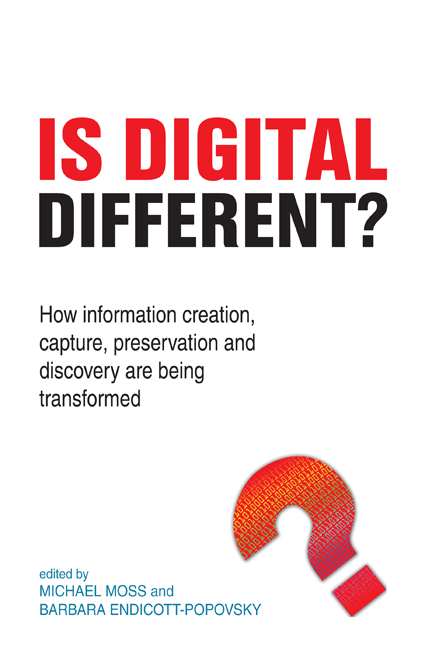 Is Digital Different?
Is Digital Different? Book contents
- Frontmatter
- Contents
- Contributors
- Introduction and acknowledgements
- 1 What is the same and what is different
- 2 Finding stuff
- 3 RDF, the Semantic Web, Jordan, Jordan and Jordan
- 4 Crowdsourcing
- 5 Pathways to integrating technical, legal and economic considerations in the design, development and deployment of trusted IM systems
- 6 Finding archived records in a digital age
- 7 Security: managing online risk
- 8 Rights and the commons: navigating the boundary between public and private knowledge spaces
- 9 From the Library of Alexandria to the Google Campus: has the digital changed the way we do research?
- Index
2 - Finding stuff
Published online by Cambridge University Press: 08 June 2018
- Frontmatter
- Contents
- Contributors
- Introduction and acknowledgements
- 1 What is the same and what is different
- 2 Finding stuff
- 3 RDF, the Semantic Web, Jordan, Jordan and Jordan
- 4 Crowdsourcing
- 5 Pathways to integrating technical, legal and economic considerations in the design, development and deployment of trusted IM systems
- 6 Finding archived records in a digital age
- 7 Security: managing online risk
- 8 Rights and the commons: navigating the boundary between public and private knowledge spaces
- 9 From the Library of Alexandria to the Google Campus: has the digital changed the way we do research?
- Index
Summary
Introduction
Admit it, today, finding stuff is very easy, maybe too easy. The senior author of this chapter should know because he has spent half his working life teaching students how to find information using Boolean operators, word proximity, field markers, nesting and all the rest of the paraphernalia associated with conducting an online search in the ‘old days’, and then only to retrieve an abstract. No need any longer; now you simply bung a word or two into an empty box, which thoughtfully corrects your spelling, and low and behold, thanks to a kindly algorithm or two, you get a huge, ranked list of annotated hits – fortunately, with the most relevant at the top. And while you might get an abstract as part of the search you will also get the whole thing and a lot more than text (hence our use of the word ‘stuff ’), there and then, usually for free – but if not, there is always a digital friend from an online community who will give it to you. If that is the case, why then devote a whole chapter to finding stuff in the digital environment? The answer is that this revolutionary form of searching and finding has naturally enough led to a revolution in the way we seek information and consume it and commentators (and parents and teachers) are split as to whether this leads to better or worse outcomes as a consequence. Equally important for this book's core readership – information professionals, libraries and, to a certain extent, publishers, once the holders of the keys to the information hoard – they have become bit-part players in the digital searching and finding business. How can that be? Surely information retrieval has long been a central part of a librarian's expertise and professional canon? Read on for the answer.
Today people do all their searching on the web, and this should come as no surprise because everything they might ever want to look for (and loads of other stuff too) is there and it is all easy to find, despite what the naysayers say, at any time of the day or night.
- Type
- Chapter
- Information
- Is Digital Different?How information creation, capture, preservation and discovery are being transformed, pp. 19 - 34Publisher: FacetPrint publication year: 2015
- 1
- Cited by


